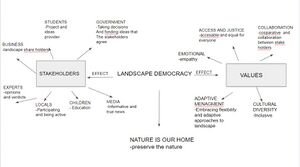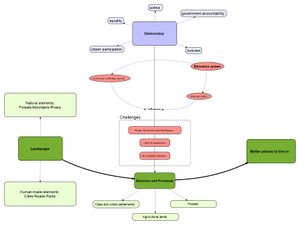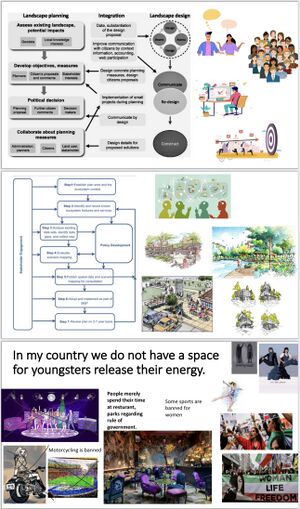Democratic Landscape Transformation 2023 - Team 15: Difference between revisions
| Line 54: | Line 54: | ||
* You may add one map per team member or an integrated one | * You may add one map per team member or an integrated one | ||
*add as many additional materials as you need | *add as many additional materials as you need | ||
[[File:Arnisa concept map.jpg| | [[File:Arnisa concept map.jpg|300px|Arnisa concept map]] | ||
[[File:Yazan mind map.jpg| | [[File:Yazan mind map.jpg|300px|Yazan mind map]] | ||
[[File:Index.php?title=File-Addyourfilename.jpg| | [[File:Index.php?title=File-Addyourfilename.jpg|300px|Farnoosh concept map]] | ||
== Please finish with a short reflection == | == Please finish with a short reflection == | ||
Latest revision as of 13:03, 23 July 2023
>>> Back to working group overview
>>> Back to seminar reading list
>>> go to the Editing Help
Background of your team
- Please write a few words about your team.
- Which linguistic and cultural perspectives are you representing? Which disciplinary backgrounds?
- Yazan: My name is YAZAN ALSHEHADEH, a master's student at the HfWU, in IMLA course my passion towards architecture led me to study Architecture at the University of Damascus and gain a bachelor's degree in it. After graduation, I gained experience by working in many places such as working in the “Observatory of Local Urban and Architectural Heritage” at Damascus University and being an architectural freelancer. Also notably, I have volunteered at Damascus University as a teaching assistant which gives me a great insight into the academic field, after that I decided to strengthen my theoretical and practical knowledge by seeking a master's degree, and that is why I am in IMLA now, and I hope I could use what I learned in this class in an effective way.
- My name is farnoosh savalanpoor. Iam studing master of architecture landscape! I would like to enhance my knowledge in this field Because most of the time i deal with different landscapes . So by gaining knowledge i can establish or design various open or public spaces for people with less amount of pitfalls and barrier and i also i can set some correct political alternatives without deprivation.In my view providing welfare and demands of people with concerning environmental factors is important! Finally, i participated in HFWU workshops that were about landscape democracy, which opened my horizon in this field by participating in various group that each of them had different kinds of people who came from various places in the world.
Your Landscape Democracy Manifestoes
Here you can add links to the manifestoes you have presented on April 26
- https://docs.google.com/presentation/d/1fhh9qsnZEVgcy_NJa3GO04zWLlSk1FbU7wekURLCSbE/edit#slide=id.p ARNISA
- https://drive.google.com/file/d/10dS76E1z0FVh0mi6drlYF-b--nHff8PJ/view?usp=sharing ANNA
- https://drive.google.com/file/d/1iSHoEM9Wd5oTGZyLX5XRo96kYiayuj3L/view?usp=sharing YAZAN
- add link https://drive.google.com/file/d/11i44DujyZk0uvEVEfEWfqri2K_Xn0ggy/view?usp=drivesdkfarnoosh savalanpoor
Examples of Landscape Activism
In the session on May 10 you will discuss examples of landscape activism from your own contexts. You can share the examples in this section (link, image and/or short explanation).
https://www.youtube.com/watch?v=94wk6FRQXKs&feature=youtu.be ARNISA
https://drive.google.com/file/d/19hagtPTW6WVLTn3wnblThWLJIkSvqtNF/view?usp=sharing ANNA
https://docs.google.com/presentation/d/1HG60eorWLAdyk2u4Moz48zkeRN5kqcCMiPr3OHnIy2U/edit?usp=sharing YAZAN
https://1drv.ms/p/s!AtSPYEwtjTqHgXN0wVqYcZdTHxtb?e=iapY0oFARNOOSH savalanpoor
The Role Play
In the session on May 17 you will present a small role play with your team. Please add here a short reflection on what you have learned from this play. The short list of landscape democracy 'movers and shakers' can be found here
LINK TO OUR ROLE PLAY https://docs.google.com/presentation/d/1tb_sFOx1QzJkLi0FPZiT_YTa7K8nuQyR3WwWg_EtP-I/edit#slide=id.gc6f59039d_0_0
>>> All information on the phase B activities is compiled in this PDF
Readings, concepts and definitions
- Start: April 5, 2023
- Due: July 5, 2023
Working in your group, express your personal understanding of the relation of landscape and democracy in the form of a concept map with linking words or any other diagrammatic representation. Please make your maps very visual and not just verbal. Think critically about why one map differs from another
About concept mapping
Before starting the exercise you can read this article by Joseph D. Novak & Alberto J. Cañas about Theory Underlying Concept Maps and How to Construct and Use Them. This paper gives a good explanation of how concept maps are conceived and developed.
You can use any tool you like for producing your concept map. However, since the result needs to be submitted digitally we recommend the following open source software for producing your maps:
- Cmap Tools >>> you can also work with your group on the Cmap cloud doing a shared map
- VUE - The Visual Understanding Environment
Please add your concept map(s) here
- Possible format: JPG (for wiki upload) or link to any other resource
- You may add one map per team member or an integrated one
- add as many additional materials as you need
Please finish with a short reflection
- What are the similarities and differences in your team regarding your understanding of what democratic landscape transformation is?
- The differences we faced were more about related to the process some of us thought it as a linear process and some more like a complex process. The similarity that we all agree on is that we all effect on the way we approach to landscape democracy and the importance of it.
- In how far did the seminar lectures and readings help you to clarify this?
- It actually helped but we think that is more of a personal approach which might be easily influenced but not totally change our beliefs , but a very important thing to mention is also that we find it very helpful the inputs and the readings which effected the way we think now.
- What will you take home from this seminar?
- We will take home many things from this module, for example like how we transfer the landscape designing process and making it more democratic and inclusive. Another important thing is how to also implant everything we have learned and to spread our knowledge to different stakeholders we will be facing to different processes.


